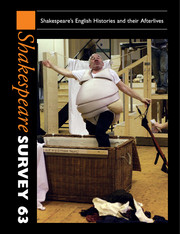Book contents
- Frontmatter
- Shakespeare the Historian
- The Decline of the Chronicle and Shakespeare's History Plays
- Rites of Oblivion in Shakespearian History Plays
- Richard II's Yorkist Editors
- Mapping the Globe: The Cartographic Gaze and Shakespeare's Henry IV Part 1
- Falstaff's Belly: Pathos, Prosthetics and Performance
- ‘And is Old Double Dead?’: Nation and Nostalgia in Henry IV Part 2
- Performing the Conflated Text of Henry IV: The Fortunes of Part Two
- Medley History: The Famous Victories of Henry the Fifth to Henry V
- Georgic Sovereignty in Henry V
- The Troublesome Reign, Richard II, and the Date of King John: A Study in Intertextuality
- The Trials of Queen Katherine in Henry VIII
- ‘Watch Out for Two-handed Swords’: Double-Edged Poetics in Howard Barker's Henry V in Two Parts (1971)
- Daunted at a Woman's Sight?: The Use and Abuse of Female Presence in Performances of the Histories as Cycles
- The RSC's ‘Glorious Moment’ and the Making of Shakespearian History
- Shakespeare as War Memorial: Remembrance and commemoration in the Great War
- Shakespearian Biography, Biblical Allusion and Early Modern Practices of Reading Scripture
- Filling in the ‘Wife-Shaped Void’: The Contemporary Afterlife of Anne Hathaway
- Shakespeare and Machiavelli: A Caveat
- Shame and Reflection in Montaigne and Shakespeare
- Playing the Law for Lawyers: Witnessing, Evidence and the Law of Contract in The Comedy of Errors
- Shakespeare's Narcissus: Omnipresent Love in Venus and Adonis
- Surface Tensions: Ceremony and Shame in Much Ado About Nothing
- ‘Remember Me’: Shylock on the Postwar German Stage
- ‘Dangerous and Rebel Prince’: A Television Adaptation of Hamlet in Late Francoist Spain
- What Shakespeare Did with the Queen's Men's King Leir and When
- Re-cognizing Leontes
- Shakespeare Performances in England 2009
- Professional Shakespeare Productions in the British Isles, January–December 2008
- The Year's Contribution to Shakespeare Studies 1 Critical Studies
- 2 Shakespeare in Performance
- 3 Editions and Textual Studies
- Index to Volume 63
‘And is Old Double Dead?’: Nation and Nostalgia in Henry IV Part 2
Published online by Cambridge University Press: 28 November 2010
- Frontmatter
- Shakespeare the Historian
- The Decline of the Chronicle and Shakespeare's History Plays
- Rites of Oblivion in Shakespearian History Plays
- Richard II's Yorkist Editors
- Mapping the Globe: The Cartographic Gaze and Shakespeare's Henry IV Part 1
- Falstaff's Belly: Pathos, Prosthetics and Performance
- ‘And is Old Double Dead?’: Nation and Nostalgia in Henry IV Part 2
- Performing the Conflated Text of Henry IV: The Fortunes of Part Two
- Medley History: The Famous Victories of Henry the Fifth to Henry V
- Georgic Sovereignty in Henry V
- The Troublesome Reign, Richard II, and the Date of King John: A Study in Intertextuality
- The Trials of Queen Katherine in Henry VIII
- ‘Watch Out for Two-handed Swords’: Double-Edged Poetics in Howard Barker's Henry V in Two Parts (1971)
- Daunted at a Woman's Sight?: The Use and Abuse of Female Presence in Performances of the Histories as Cycles
- The RSC's ‘Glorious Moment’ and the Making of Shakespearian History
- Shakespeare as War Memorial: Remembrance and commemoration in the Great War
- Shakespearian Biography, Biblical Allusion and Early Modern Practices of Reading Scripture
- Filling in the ‘Wife-Shaped Void’: The Contemporary Afterlife of Anne Hathaway
- Shakespeare and Machiavelli: A Caveat
- Shame and Reflection in Montaigne and Shakespeare
- Playing the Law for Lawyers: Witnessing, Evidence and the Law of Contract in The Comedy of Errors
- Shakespeare's Narcissus: Omnipresent Love in Venus and Adonis
- Surface Tensions: Ceremony and Shame in Much Ado About Nothing
- ‘Remember Me’: Shylock on the Postwar German Stage
- ‘Dangerous and Rebel Prince’: A Television Adaptation of Hamlet in Late Francoist Spain
- What Shakespeare Did with the Queen's Men's King Leir and When
- Re-cognizing Leontes
- Shakespeare Performances in England 2009
- Professional Shakespeare Productions in the British Isles, January–December 2008
- The Year's Contribution to Shakespeare Studies 1 Critical Studies
- 2 Shakespeare in Performance
- 3 Editions and Textual Studies
- Index to Volume 63
Summary
The marking and remarking of history – personal or national – is arguably one of the most consistent topoi in the Western canon, let alone in Shakespeare; personal anxieties of ageing persist and prevail in vocal counterpoint to memorial reconstructions of ‘historical’ or political events. The two justices of 2 Henry IV, Shallow and Silence, are what Hamlet probably never intended in his reference to the players as ‘abstract and brief chronicles’ (2.2.524). And yet they are, in another sense, precisely ‘abstract’ if perhaps not quite ‘brief’ almanacs of both personal and political recollections that articulate the relation of war and remembrance to memory and nostalgia. So are several other representations of ‘geezerdom’ seen and heard throughout the second tetralogy: Gaunt, York and of course Falstaff. In this article I want to trace out the justices’ personal frames for measuring and remembering ‘history’ as localized and alternative versions of their play's (and the tetralogy's) larger concerns with time, succession, memory, obsolescence and war – all inevitable and simultaneously dangerous to incumbent order.
As one-fourth of the second tetralogy, 2 Henry IV inescapably focuses on time and remembrance, and on the national crisis sprung, two plays and a represented generation earlier, by Richard II's deposition, the consequent breach in succession, and on Henry IV's role in that breach. These of course are the play's large issues; in their midst Shakespeare pauses to reflect on time's passage and remembrance in terms more minutely focused.
- Type
- Chapter
- Information
- Shakespeare Survey , pp. 78 - 88Publisher: Cambridge University PressPrint publication year: 2010

